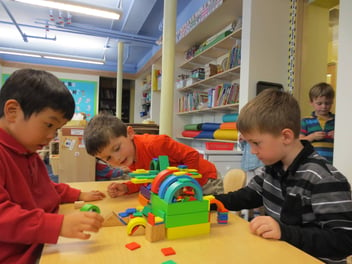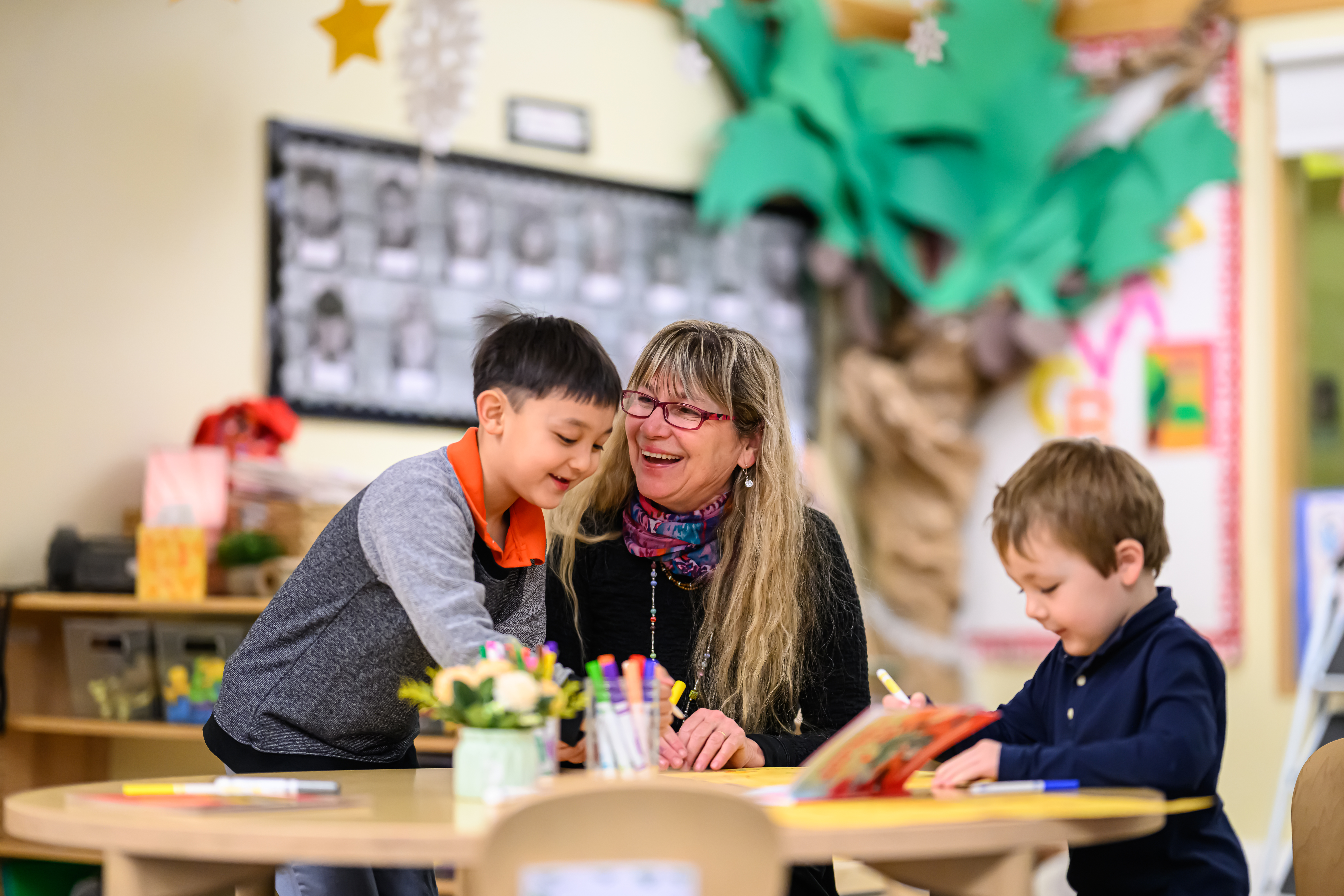Whether your son is advancing from private Pre-K or entering school for the very first time, kindergarten will be a very different world for him. In kindergarten, your son’s social skills, motor skills, and cognitive abilities will be challenged in many ways, which is why preparing for kindergarten at home is so important.
In our article, “7 Signs Your 5-Year-Old Is Ready For Private Kindergarten,” Boston-based educational consultant Carol Kinlan talked about some of the abilities and traits your son will need for a smooth transition to kindergarten. A popular Scholastic article lists some of these skills, as well.
But what if your son is lacking in a few of these areas?
Don’t worry. Your son is not necessarily in for a rocky first year. First, in a high-quality kindergarten program, your son’s teachers will adapt your son’s curriculum to his learning style and background, making sure he gains the skills and knowledge he needs in kindergarten to go on to the rest of elementary school with confidence.

Second, there are plenty of things you can do at home to help your son get ready for kindergarten. Carol shared a few of these everyday opportunities, and we've added more to this article to give you plenty of ideas.
To your son, most of these are just fun activities. But as he does them with you, he will be honing basic skills to take on the challenges of the kindergarten classroom.
1. Read with him
Reading is one of the first things many parents think about when getting their child ready for Kindergarten, and for good reason! When you cozy up with a book, you're not just sharing tales of adventure, courage, and friendship with your son. You're nurturing a love for reading and equipping him with crucial language and comprehension skills that kindergarten teachers value. Even if he can already read independently, this shared activity deepens his appreciation for books, enriches his vocabulary, fosters critical thinking, and provides valuable bonding time.
Not sure which books to pick? Check out our favorite books for 5-year-old boys. You should also take him to the local library and let him pick some out on his own. To get additional benefits from your reading time, choose books about kindergarten. These stories will give your child a glimpse into his upcoming world, making the transition less intimidating.
2. Let your son set the dinner table.
Children need and like a sense of responsibility, Carol says. Setting the table is one fairly harmless way for your son to become comfortable taking personal responsibility for a project that benefits a larger group—your family.
If the task of setting the table seems a little mundane, Carol recommends, “Put a little flare into it. Say, ‘Put out the plates and little Joe the Bear might show up tonight.’”
Setting the table also helps children develop counting skills as they make sure they leave enough places for everyone (including Joe the Bear).
3. Talk your son through your cooking projects.
An increasingly common condition among older children, Carol says, is executive function weakness, an inability to initiate, plan, organize, and complete tasks.
“One of the reasons we’re seeing more of it now than we did 30 years ago is that there is just more homework and more activities going on than the brain of a pre-teen or teenager can handle,” she explains. “From a neurodevelopmental standpoint, boys struggle more with this than girls.”
You can start helping your son develop his organizational thinking skills by talking him through common activities like cooking.
“Let’s say they have to make cookies. You bring out the little box with the ingredients. You talk methodically about every step: ‘We have to get the eggs out. Can you get the eggs out? The eggs go here, and the milk goes here,’ and so on,” Carol describes. “Listening to you plan out each step is phenomenally helpful in developing a sense of mindfulness and being very intentional about things versus, ‘We’re going to make cookies. Isn’t this great?’”
4. Encourage him to write.

Helping your son develop writing skills early on can do wonders for his cognitive growth, fine motor skills, and creativity. The journey to writing can start with fun interactive activities. Ask him to draw pictures and create stories that correspond with them or write a simple letter to a family member.
These activities not only foster a love for writing but also set a strong foundation for those essential skills he'll need on the first day of school.
If your son isn't quite ready to write sentences, encourage him to tell stories about his drawings verbally instead. This way, he's introduced to the magic of storytelling in a fun, subtle way. Remember, every step, small or big, brings him closer to becoming a confident writer.
5. Use plastic bottles to teach your son about variations in sound.
This is also a tip for reusing those plastic bottles you would otherwise recycle.
Fill a few bottles with small pebbles, rice, marbles, or anything else that would make a noise when you shake it. Shake the bottles or have your son shake them. Ask him about the different sounds he hears. What does it sound like? Can he tell the difference between the bottles? If he empties out one bottle and refills it with sand, would it sound different?
“It sounds simple, but you’re helping your child not look at the environment in a clumsy way, but being more particular about what’s around him,” Carol says.
6. Develop routines.
A daily routine is crucial in preparing your child for kindergarten. A well-planned morning routine may include making his bed, brushing his teeth, and getting dressed, but routines shouldn't just be about completing tasks. Try to create a familiar pattern of simple activities that can provide a comforting structure to your child's day.
Introducing school routines at home, such as a set time for reading or creative play, can give him more confidence and familiarity on his first day of school.
7. Take the time to teach sharing, respect for the rules, and respect for others.
“How do you take an egocentric child and have them look outside of themselves?” Carol asks.
If you feel your son is struggling with sharing and respect, the key is to be very clear about, “what’s in it for him,” Carol explains. Make sure your son understands that when he treats others with respect and shares with his friends, he will have more fun on play dates and in school. Other children will want to share with him, as well.
“At this age, all children know is their viewpoint. They can even look at a mirror and ask, ‘Who’s that?’ It takes a little while to understand other people,” she says.
8. Set up playdates.
What better way to teach your son to share than to set up times for him to play with other children his age? If your son has regular playdates, he'll have a playground for learning fundamental life skills. As he interacts with his peers, he'll learn to communicate, share, take turns, and solve conflicts — all skills that will serve him well on school days. And if he's used to being around a group of other boys, he'll likely be more confident on his first day of kindergarten.

9. Play board games.
Playing board games with your son is a great way to spend quality time together and an excellent opportunity to prepare him for kindergarten, too. Board games seamlessly blend fun with learning, providing an interactive medium to bolster his academic skills. For instance, many games require counting, pattern recognition, and strategic thinking, which are all foundational math concepts.

Rolling a dice and moving a piece across the board can help your son understand number sense and sequencing. But board games aren't just about math. They also require players to follow rules, take turns, and practice patience. So, family game nights can create joyful memories while setting up your son for academic success in his upcoming kindergarten year.
Pre-K & Kindergarten Private School Visit Checklist
If you are looking for a high-quality kindergarten program for your son, follow this link for a free copy of the Pre-K & Kindergarten Private School Visit Checklist. It will help you ask the right questions as you search for the perfect fit for your son.
Read On

7 Signs Your 5-Year-Old Is Ready For Private Kindergarten

4 Skills That Will Help Your Son Do Well in Kindergarten


